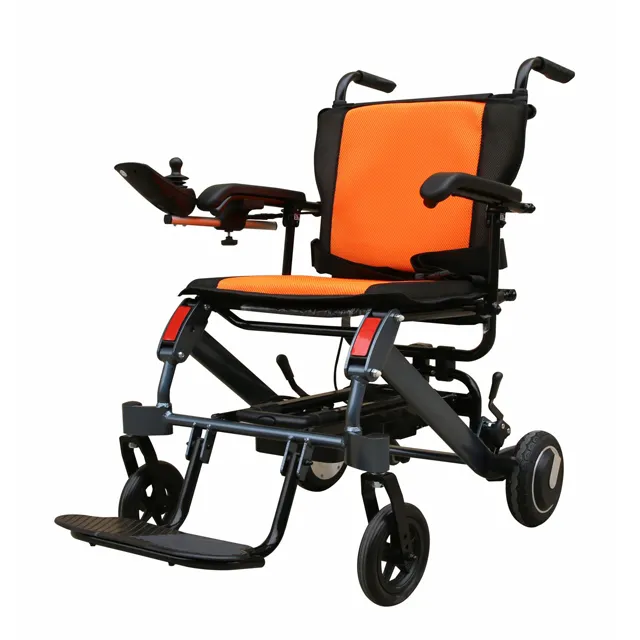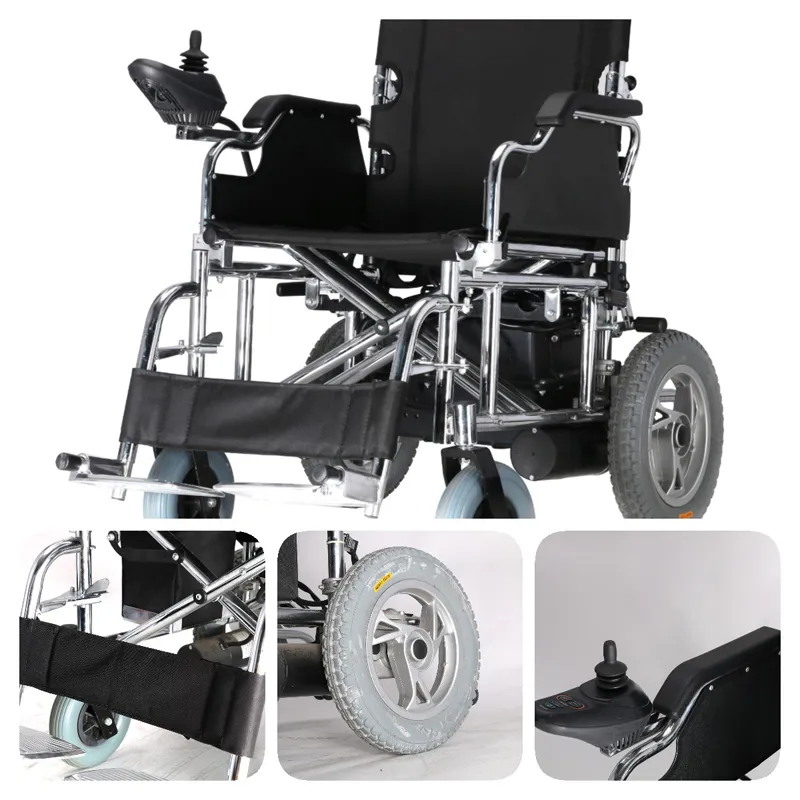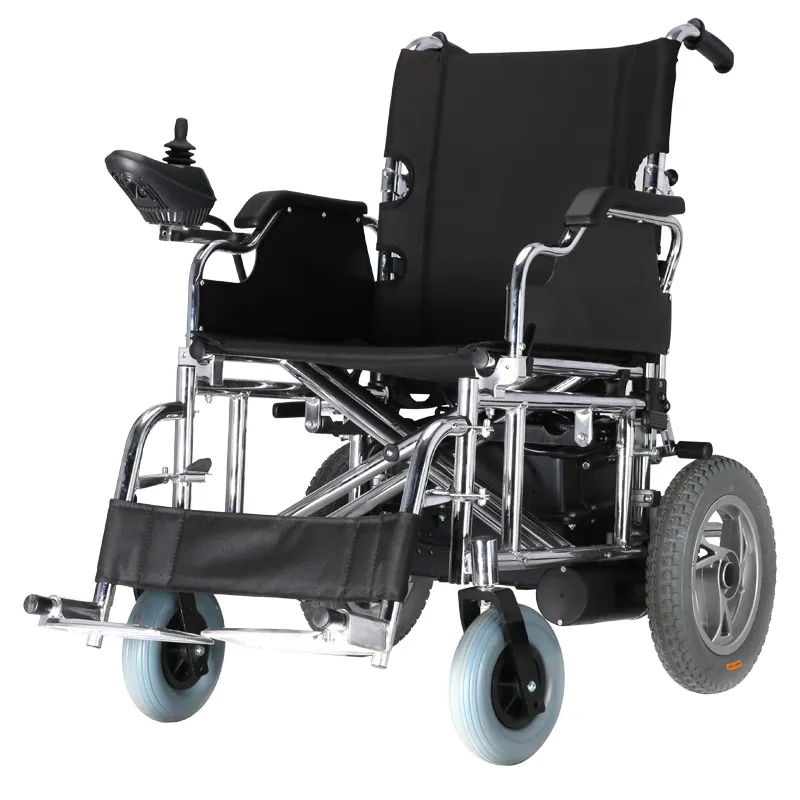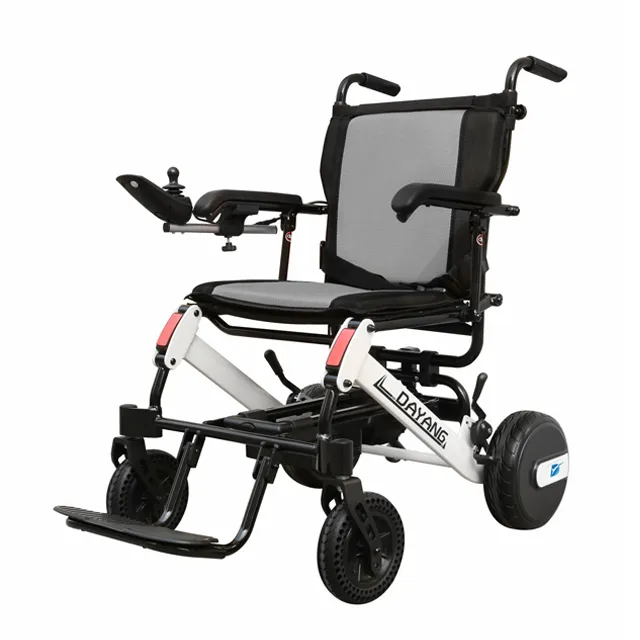—Why Choose Between Lightweight and Heavy-Duty Electric Wheelchairs?
For people with mobility impairments or the elderly, electric wheelchairs are essential assistive devices in daily life.
However, the market offers a wide variety of electric wheelchairs, the most common being lightweight and heavy-duty models.
While both are electrically powered, they differ significantly in weight, load-bearing capacity, power system, battery life, and suitable usage environments.
Choosing the right type not only improves the travel experience but also affects the user's safety and comfort.
Therefore, understanding the advantages and disadvantages of lightweight and heavy-duty electric wheelchairs is essential before purchasing.
What is a Lightweight Electric Wheelchair?
Lightweight electric wheelchairs are made of lightweight metals (such as aluminum alloy and carbon fiber), typically weighing between 20 and 30 kilograms.
The design philosophy centers on "lightweight, foldable, and easy to operate," emphasizing portability and freedom of movement for the user.
Key Features of Lightweight Electric Wheelchairs:
• Lightweight: Can be folded and carried by a single person;
• Compact Structure: Can fit in a car trunk or elevator;
• Low Power System: Power typically between 150W and 250W;
• Moderate Range: Approximately 10-20 kilometers;
• Suitable for: Elderly people, short-distance travelers, and users of average weight.
Material Characteristics of Lightweight Electric Wheelchairs:
Most lightweight electric wheelchairs use aluminum alloy, balancing strength and corrosion resistance; high-end models even utilize carbon fiber structures, making the entire vehicle lighter and easier to store.
In summary: Lightweight electric wheelchairs = Lightweight + Foldable + Flexible.

What is a Heavy-Duty Electric Wheelchair?
Heavy-duty electric wheelchairs are electric wheelchairs with high-strength steel or thick-walled aluminum alloy as their main structure, typically weighing over 40-70 kg.
They are designed for high loads, complex terrain, and prolonged use, emphasizing stability, power, and load-bearing capacity.
Key Features of Heavy-Duty Electric Wheelchairs:
• Robust Structure: Thick frame, strong anti-tipping capability;
• More Powerful: Motor power up to 250W~500W;
• Longer Range: Large battery capacity, allowing for a range of 20~30 kilometers or more;
• High Load Capacity: Typically capable of supporting 120 kg or more;
• Suitable for: Heavier individuals, those requiring prolonged use, or those needing high stability.
In short: Heavy-duty electric wheelchairs = Stability + Powerful + Long Range.

What are the differences between light-duty and heavy-duty electric wheelchairs?
Comparison Dimensions | Lightweight electric wheelchair | Heavy-duty electric wheelchairs |
| Overall Vehicle Weight | Approx. 20-30kg, lightweight and foldable | Approximately 40-70kg, heavy structure |
| Load Capacity | Medium (≤100kg) | High (≥120kg) |
| Motor Power | 150W~250W | 300W~500W |
| Range | Approx. 10~20km | 20~30km/h+ |
| Folding Capacity | Strong, can be stored for single person | Weak, mostly fixed structure |
| Usage Scenarios | Indoor/short distance on flat ground | Outdoor/complex terrain |
| Maintenance Costs | Lower | Higher performance |
| Portability | Excellent | General |
As the table shows, light-duty electric wheelchairs excel in portability, while heavy-duty electric wheelchairs are superior in performance and durability.
What are the advantages of light-duty electric wheelchairs?
1. Lightweight and Easy to Carry
The most significant advantage of light-duty electric wheelchairs is their portability.
Users or caregivers can easily fold, carry, and load them into a car trunk, allowing for unrestricted travel.
Key Advantages:
• Foldable with single-person operation;
• Suitable for home storage;
• Easier to go up and down stairs and enter/exit elevators.
2. Simple operation, suitable for first-time users
Lightweight electric wheelchairs typically have simpler control systems, using a one-handed joystick design, making them easy to learn.
Especially suitable for the elderly, those with limited physical strength, or those just starting to use electric wheelchairs.
3. Energy-saving, low noise, and easy maintenance
Due to the use of a low-power motor and lithium battery system, lightweight electric wheelchairs consume less energy and produce less noise during use.
Cleaning and maintenance are also relatively convenient, requiring no complicated procedures.
4. Suitable for short-distance and daily travel
While the battery life of lightweight electric wheelchairs is not as long as that of heavy-duty electric wheelchairs, it is perfectly adequate for short-distance daily travel such as indoor activities, shopping, and walks.

What are the disadvantages of lightweight electric wheelchairs?
1. Insufficient load-bearing capacity
Lightweight electric wheelchairs have a thin and light structure, suitable for users of medium weight.
If the user weighs more than 100 kg, it may lead to frame fatigue and deformation or increased motor load.
2. Relatively Weak Power and Stability
On inclines, grassy areas, or uneven surfaces, lightweight electric wheelchairs are prone to insufficient power or swaying.
While the anti-tipping design has improved, it is still not suitable for use on rough terrain.
3. Limited Battery Life
Lightweight electric wheelchairs have smaller battery capacities, making them suitable for short trips.
Prolonged outdoor use can lead to battery anxiety.
What are the advantages of heavy-duty electric wheelchairs?
1. Strong Load-Bearing Capacity and Stable Structure
Heavy-duty electric wheelchairs utilize sturdy steel or thick-walled aluminum alloy frames, easily supporting weights exceeding 120 kg.
This means they are more stable and less prone to deformation over long-term use.
2. Powerful Motors and Versatile Terrain Capabilities
High-powered motors and large-capacity batteries give heavy-duty electric wheelchairs superior climbing ability and terrain adaptability.
Whether going uphill, downhill, on grass, or on cobblestone paths, they maintain a stable ride.
3. Long Battery Life
Heavy-duty electric wheelchairs are generally equipped with high-capacity lithium or lead-acid batteries, offering a range of 25-30 kilometers, suitable for extended use.
4. Superior Comfort
Due to their sturdy frames, wider tires, shock absorption systems, and thickly padded seats, heavy-duty electric wheelchairs offer excellent comfort.
They are particularly suitable for users who spend long periods of time in the wheelchair.
What are the disadvantages of heavy-duty electric wheelchairs?
1. Too Heavy, Difficult to Move
Heavy-duty electric wheelchairs typically weigh over 50 kg, making them difficult to move and their folding structure is complex.
They are inconvenient to operate for users who need to travel frequently or store themselves.
2. High Cost and Maintenance
Heavy-duty electric wheelchairs use high-power motors and large-capacity batteries, resulting in a higher price; at the same time, the cost of repair and replacement parts is also relatively higher.
3. Not Suitable for Confined Spaces
Due to their larger size, heavy-duty electric wheelchairs are difficult to maneuver in confined indoor environments and are less agile than light-duty electric wheelchairs.
Who are Light-Duty and Heavy-Duty Electric Wheelchairs Suitable For?
1. Lightweight electric wheelchairs are suitable for:
• Elderly people or patients in rehabilitation;
• Individuals with limited mobility but still possessing upper limb control;
• Users who frequently need to go out or carry a wheelchair;
• Families living in small spaces or on high floors.
2. Heavyweight electric wheelchairs are suitable for:
• Individuals who are heavier or rely on wheelchairs for long-term mobility;
• Users who frequently travel outdoors or in complex terrain;
• Individuals who desire a more stable and comfortable riding experience;
• Users who require long battery life and strong power support.
Summary: Lightweight electric wheelchairs are more portable, while heavyweight electric wheelchairs are more powerful. The choice depends on your weight, activity level, and frequency of use.

How to make a rational choice between lightweight and heavyweight electric wheelchairs?
When purchasing an electric wheelchair, you can consider the following three dimensions:
1. Choose according to usage scenario
• Indoor/short distance → Lightweight electric wheelchairs are more suitable;
• Outdoor/long distance → Heavyweight electric wheelchairs are more stable and powerful.
2. Choose by Weight and Body Type
• Weight ≤ 100kg → Lightweight electric wheelchair;
• Weight ≥ 100kg → Heavy-duty electric wheelchair.
3. Choose by Usage Frequency
• Occasional use → Lightweight electric wheelchair: economical and convenient;
• Long-term use → Heavy-duty electric wheelchair: stable and durable.
Overview of the Advantages and Disadvantages of Lightweight and Heavy-duty Electric Wheelchairs
Item | Lightweight electric wheelchair | Heavy-duty electric wheelchair |
| Weight | Lightweight and easy to move | Heavy, difficult to move |
| Load Capacity | Medium | Strong |
| Power Performance | Stable, suitable for flat ground | Powerful, suitable for complex terrain |
| Range | Average (10-20km) | Excellent (20~30km) |
| Comfort | Medium | High |
| Foldability | Excellent | General or none |
| Suitable Environment | Indoor/Flat ground | Outdoor/Long distance |
| Price Range | Medium | Slightly high |
| Maintenance Cost | Low | High |
Lightweight vs. Heavy-duty Electric Wheelchairs: How to Choose?
When choosing an electric wheelchair, there is no absolute "better," only "more suitable."
If you value portability, lightweight design, and easy storage—
✅ A lightweight electric wheelchair is the ideal choice.
If you value stability, power, and comfort more—
✅ A heavy-duty electric wheelchair is necessary to meet long-term use needs.
Key Takeaways:
"Lightweight electric wheelchairs are suitable for short-distance, flexible travel, while heavy-duty electric wheelchairs are suitable for long-distance, stable mobility. Before purchasing, be sure to consider your personal weight, usage environment, and driving ability."
Is Dayang Medical a certified manufacturer?
Yes, Dayang Medical is a fully certified manufacturer in China. We have passed ISO13485, ISO9001, FDA, and CE certifications, which guarantee that all our products meet international medical device standards. This ensures that customers who buy from our company receive safe, reliable, and high-quality products.
Our certifications also make us a preferred supplier for wholesale purchasing in Europe, North America, and Asia.


